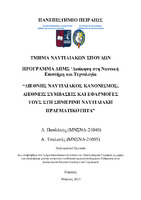Διεθνής Ναυτιλιακός Οργανισμός, Διεθνείς συμβάσεις και εφαρμογές τους στη σημερινή ναυτιλιακή πραγματικότητα

View/
Keywords
IMO ; Διεθνείς συμβάσεις ; Μarine pollution ; Ballast water managementAbstract
Shipping and maritime transport is of critical importance, in order to achieve economic growth and prosperity. The shipping industry plays a central role in world trade as it transports approximately 90% of the products of international trade. It is clear that the transport of all kinds of goods by sea is the backbone of global trade and thus of the world economy and globalisation. The shipping industry, operating continuously 24 hours a day, 7 days a week, is the main guarantor for ensuring the balance between supply and demand for raw materials, consumer goods and even energy sources between countries. It is precisely this importance of shipping and the gigantic size of the shipping industry that brings to the fore the rules and the regulatory framework in which it should operate.
In the context of this thesis, an attempt will be made to reference and analyse the main IMO maritime conventions, with particular emphasis on the implementation of international conventions related to the environment, as well as the Greek strategy for the implementation of these conventions. In the first four (4) chapters we refer to the structure and history of the IMO, we analyse what an international convention is and what its characteristics are and finally we mention and make a short analysis of the main, but also individual, maritime conventions governing shipping.
In chapter 5 we focus on the extensive analysis of the two (2) maritime conventions concerning the environment, namely MARPOL and BWM. Then in chapter six (6) we see who the stakeholders of the Greek administration are, as well as its objective goals in the context of the implementation of the international conventions of the IMO.
Finally, in chapter 7 we refer to the reason why these conventions were established and how Greek and not only Greek shipping companies accepted and applied the above regulatory framework in order to provide high quality transport services.


